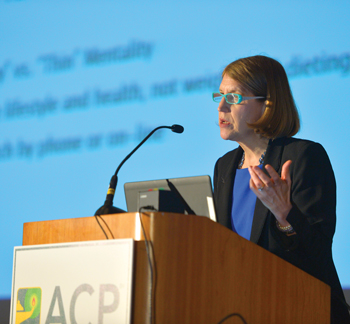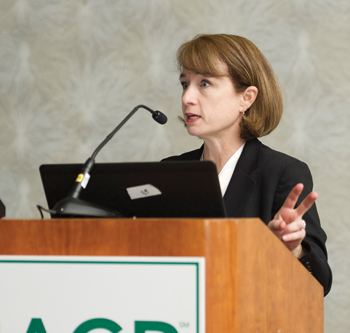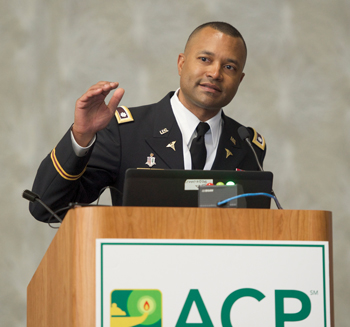Another tag line—almost as good
ACP's president addresses the investment in and commitment to bedside diagnosis and physical exam skills.
I remember reacting to ACP's tagline “Leading Internal Medicine, Improving Lives” when it was first presented to the Board of Regents a few years ago. I liked it right away. I liked it even more when I learned that the hallmark of a good tagline is that it should present a double meaning. (“Just Do It” is every ad exec's favorite.) “Improving Lives”? Hmmm. Whose lives? The doctors'? Their patients'? Their families'? With apologies to our expert MKSAP question authors who never, ever, would allow the option “all of the above,” here the answer is, yes, all of the above.
When I prepared a lecture recently on one of my career-long campaigns, getting internists (and their students and residents) back to the bedside, focusing on the history and physical exam, I knew just what I needed to make my case: a tagline, and it needed to be a good one. So with “Leading Internal Medicine, Improving Lives” as my template, I finally came up with this one: “Listening to Patients, Directing Their Care.”
It certainly had the requisite double meaning—two of them, in fact. Listening to patients could mean attending to what they were saying, as well as listening to their lungs, their hearts, and maybe even their thyroids for that rare but diagnostic bruit that is indicative of Graves' disease. And “Directing” referred to, well, directing: not necessarily making diagnoses, although that certainly happens often enough at the bedside, but directing in the sense of providing a road map for further diagnostic evaluation and guiding therapy. Directing also meant stepping up and taking charge, being hands-on. Patients like that. So I had my tagline. Now on with the campaign.
It's fair to ask why a campaign is needed. Why are physical examination skills flagging? Why do we need to sound the alarm?
There are no shortage of reasons why investment in and commitment to bedside diagnosis are on the decline. The lure of lab tests, the temptation of technology, and the urge to image, along with the protocolized patterns of care in which work-ups are put in place even before a patient is assessed, are but a few explanations. Discomfort with one's own bedside skills is another. Any of us could complete this list.
But so too are there strong reasons to return to the bedside. Consistent with the College's very appropriate emphasis on high-value care, what can compete with a well-done cardiac exam to support or refute the diagnosis of congestive heart failure with the most benefit for the least cost, or with an accurate identification of pedal pulses to obviate the need for arterial Dopplers or ankle-brachial indexes?
Why, I ask, do our processes in the U.S. for licensure, privileging, certification, and recertification not focus on skills in physical examination? In the United Kingdom, the MRCP Part 2 Clinical Examination contains the Practical Assessment of Clinical Exam Skills (PACES). Nothing guides curriculum more than evaluation. Imagine how focused we all would be on maintaining our bedside skills if we knew it would be “on the test”?
Moreover, housestaff and students want to learn bedside diagnosis. They are interested! They are ready to learn. This is critical, as they are the teachers of tomorrow. If we do not pass bedside skills on to our learners, they will have no chance of passing these skills along to their learners. And at that point, medicine will have lost something vital.
I am not alone in this campaign. I suspect there are local leaders at almost all medical centers. You can usually spot us. We tend to be somewhat older, and we carry reflex hammers that look like reflex hammers, not pink or orange rubber triangles on a stick. And there also are national leaders. Sal Mangione, MD, is one; his sessions at ACP's annual Internal Medicine Meetings are irreplaceable. Steve McGee, MD, FACP, is another leader. I refer to his book as “the Bible,” but it is more readily located on Amazon as “Evidence-Based Physical Diagnosis.” Abraham Verghese, MD, MACP, writes eloquently about the symbolic value of physical examination, while centering the physical exam within the curriculum of residency training. Andrew Elder, BSc, MBChB, is bringing us up to speed with what is happening in the United Kingdom, including PACES. These efforts are critical. If physical exam skills fall by the wayside, medicine will have lost part of its substance and part of its soul.
But souls can be reclaimed. Physical exam skills can be learned, or relearned. All it takes is commitment, enthusiasm, and patience. A session at the Herbert S. Waxman Clinical Skills Center at our next Internal Medicine Meeting in New Orleans will assure you that you are not alone. In fact, I sense a renewed enthusiasm for learning bedside diagnosis. Nothing augers better for the future of our beloved specialty.
It is an honor to serve as your President, to lead our College, and to have the opportunity to share my thoughts on issues of importance to internal medicine. Please let me hear from you.





